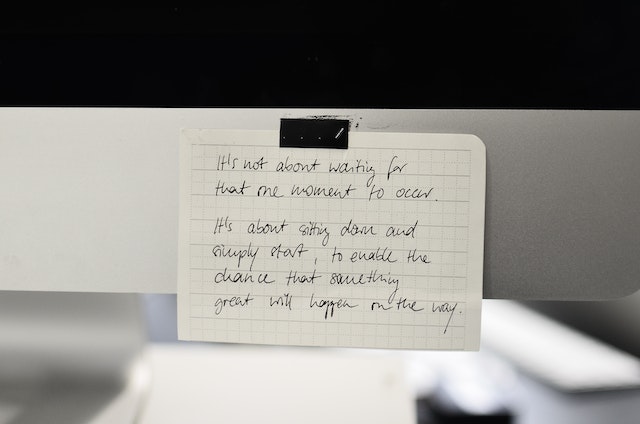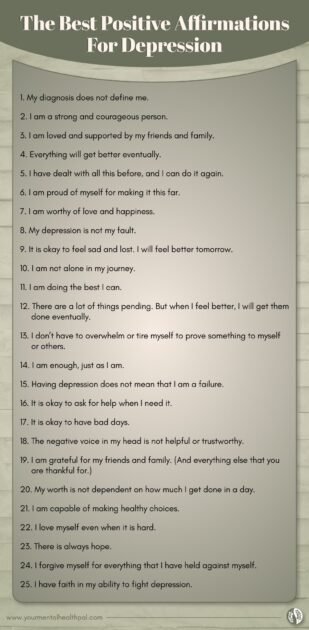Depression is tough, isn’t it?
We are asking you because you’ve clicked on this blog post while searching for positive affirmations for depression. So, we are assuming there’s a connection, right?
Maybe you are struggling with the condition yourself. Or perhaps you’ve watched or are watching someone you dearly love deal with it.
While depression exists on a spectrum, and each person’s experiences are different, there is something that we can all agree upon. Depression is real. It is extremely hard. And it is as stubborn and rebellious as that tantrum-throwing kid in the mall. When it gets a grip on your life, it can make everything really, really hard.
From something as simple as getting up in the morning to brushing your teeth, deciding what to have for breakfast (and lunch and dinner – that’s a LOT), cleaning the house, and the broken bottle of sauce – depression can make you feel like taking the next step or even the next breath is completely out of your ability to function.
One of the worst parts of having depression is the deep pit of negative and intrusive thoughts you have. It is the part where you have to live day in and day out while dealing with an obnoxious voice in your head that just doesn’t shut up. It constantly makes you feel like a failure and makes it difficult to feel worthy as a human. It can soon take over your sense of self and cause long-term damage if left unchecked.
This is why having the right coping mechanisms while you continue your fight against depression is essential. And this is precisely where positive affirmations for depression come into place. They are like little ‘pick me ups’ or letters from your calmer, rational self to the person you become due to your depression symptoms.
But what are positive affirmations for depression, and do they really help with your symptoms?
If you are doubtful about them, we understand. Positive affirmations might sound like a vague, non-sciency coping mechanism for depression. But they are so much more than that.
To help you get started, we will dive into the science behind positive affirmations for depression. We will also look at the 25 best daily affirmations and determine how to use them properly.

But First, What Are Positive Affirmations?
You might have heard about positive affirmations if you are into self-help books. They are well-known ways to transform your negative thoughts into positive ones. Positive affirmations are statements you can use to have a healthy dialogue with yourself and boost your self-esteem. Over a period of time, they can help you reduce the bickering of constant negative self-talk.
Today, almost everyone is talking about the power of positive affirmations. But, if you have never tried them, they can sound like a vague and bizarre idea altogether.
But hear us out before making your internal judgments.
You see, your thoughts are a reflection of your beliefs. So, if your thoughts about yourself or your life are laced with negativity and despair, so are your beliefs. These negative beliefs often get so internalized inside you that you start using them to define yourself.
Having positive affirmations allows you to reframe or replace these negative beliefs. They can help you become kinder to yourself and cultivate a resilient mindset. This way, you are better equipped to deal with setbacks. Once you reprogram your beliefs, you will eventually begin to think and act better.
So, Do These Positive Self-Affirmations For Depression Actually Work?
While positive affirmations for depression might not be a cure or replacement for professional help, they can certainly help with managing your mood. They are an effective addition to your treatment plan.
Research published in Social Cognitive And Affective Neuroscience shows positive affirmations can impact neural pathways. They can redirect the thought processes in your brain. This way, they can also help you manage the unhealthy and negative thoughts and beliefs associated with depression.
Other empirical studies have found that positive affirmations have:
- reduced stress levels in participants,
- proven beneficial in motivating people during programs that required them to be physically active,
- reduced people’s resistance to messages that they otherwise perceived as dangerous (like medical health interventions),
- reduced people’s tendency to ignore health warnings,
- increased people’s desires to stay healthy,
- helped calm nerves and build confidence before stressful events,
- improved GPA in college students dealing with social isolation, and
- decreased overthinking and rumination.

How To Start Using Words Of Affirmation For Depression?
When dealing with depression, the very idea of using positive affirmations can feel daunting and overwhelming. Depression makes it extremely hard to be hopeful about anything related to you or your life. Therefore, starting slow and taking baby steps is the best way to start using affirmations to help with depression.
Here are a few ways to use positive mantras for depression in the best possible way:
1. Write them down.
Write your positive self-affirmations for depression on sticky notes that put them in places where you can see them daily. You can also write them down in the notes section of your phone for times when you are away from home or use them as reminders.
2. Choose one affirmation a day.
For starters, aim for one daily affirmation for depression every day. Set aside time to repeat this mantra right after waking up and before bed. Try to ensure you do this around the same time every day. This induces habit generation and internalizes the message of the mantra. Additionally, you can try adding these affirmations to your commute, daily exercise, etc.
3. Use an app.
We live in the era of technology, and there seems to be an app to help you with everything. Similarly, there are multiple apps that you can tune into to help you start using daily self-affirmations for depression. Think Up, I Am, and Shine are the most preferred options.
4. Read or recite them out loud.
You can use positive self-affirmations for depression anytime, anywhere. You can give a pep-talk to yourself in front of the mirror, on your way to work, or when your depression symptoms threaten to destabilize your day. It helps to resonate more with the affirmation when you say it out loud.
What Are The Best Positive Affirmations For Depression?
As we mentioned above, incorporating positive affirmations in your life can initially feel extremely daunting. To help you get started, here are 25 daily affirmations for depression that can help you begin your journey:
1. My diagnosis does not define me.
2. I am a strong and courageous person.
3. I am loved and supported by my friends and family.
4. Everything will get better eventually.
5. I have dealt with all this before, and I can do it again.
6. I am proud of myself for making it this far.
7. I am worthy of love and happiness.
8. My depression is not my fault.
9. It is okay to feel sad and lost. I will feel better tomorrow.
10. I am not alone in my journey.
11. I am doing the best I can.
12. There are a lot of things pending. But when I feel better, I will get them done eventually.
13. I don’t have to overwhelm or tire myself to prove something to myself or others.
14. I am enough, just as I am.
15. Having depression does not mean that I am a failure.
16. It is okay to ask for help when I need it.
17. It is okay to have bad days.
18. The negative voice in my head is not helpful or trustworthy.
19. I am grateful for my friends and family. (And everything else that you are thankful for.)
20. My worth is not dependent on how much I get done in a day.
21. I am capable of making healthy choices.
22. I love myself even when it is hard.
23. There is always hope.
24. I forgive myself for everything that I have held against myself.
25. I have faith in my ability to fight depression.
How To Write Your Own Positive Self-Affirmations For Depression?
While having a template of affirmations that help with depression is great, it might not be useful to everyone. Depression is not a one-size-fits-all problem. Everyone dealing with the condition will experience different challenges and intensity of depression symptoms. Therefore, they might need to craft their own words of affirmation for depression.
Now, you don’t need to be a born writer to craft affirmation statements for yourself. Any phrase targeting a specific area, behavior, or thought you’re currently struggling with is an affirmation.
All you need to do is trust yourself. There is no one better to understand what you need to hear at a given moment. So trust your instincts.
Here are a few tips that will help you write daily positive affirmations for yourself:
1. Write statements that balance out your negative beliefs.
Positive affirmations are a tool to cut through the overwhelming negative self-talk inside your brain and help you reconstruct your thoughts. Therefore, having positive affirmations for depression that help you alter your negative bias and focus more on positive things will be of great help.
2. Write in the present tense.
Use present tense while writing and recite your affirmations to convey a sense of belief. For instance, “I am prepared to calm my nerves and give a presentation right now” is a great affirmation to counter your stress in the present moment.
Conclusion:
Depression is tough and takes an intense toll on your ability to function and think properly. You are filled with negative thoughts and beliefs affecting your regular life and treatment plans. This is why positive affirmations for depression are a helpful coping mechanism to counteract the negative bias and reconstruct your belief system.
Affirmations that help with depression allow you to manage your symptoms more effectively and prioritize your well-being. While they might not be a magical cure for depression, they are certainly a good and safe coping tool.
With that said, positive affirmations cannot and should not replace professional help in any case. Getting professional help is now easier than ever with the advent of online therapy platforms. To learn more about the top online therapy platforms, click here.
To continue learning about mental health daily, subscribe to Your Mental Health Pal.

